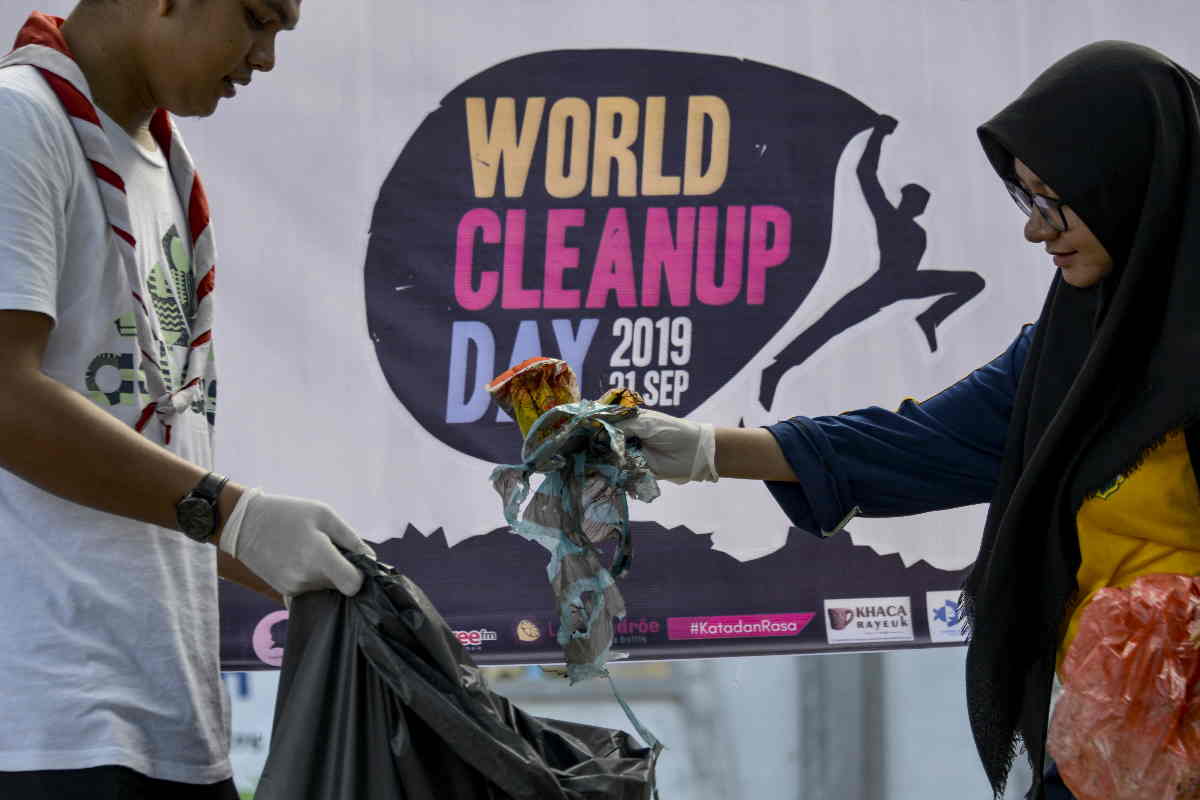Thousands of volunteers wielding nets and bin bags scoured coasts, parks and riverbanks across the globe Saturday, in a litter-picking drive highlighting the vast quantity of trash dumped worldwide, a day after mass international climate protests.
Campaigners took part in World Cleanup Day from Manila to the Mediterranean, as hundreds of thousands of people across the world take part in demonstrations and activities calling for urgent action on the environment.
Young people have been at the forefront of the movement, with masses of children skipping school on Friday for a global climate strike, which teen activist Greta Thunberg said was "only the beginning".
Some four million people filled city streets around the world on Friday, organizers said, in what was billed as the biggest ever protest against the threat posed to the planet by rising temperatures.
The World Cleanup Day – an initiative that has got millions into the streets and cleaning up litter across the globe since it began just over a decade ago – falls at the beginning of a week of climate action called for by Thunberg, who will attend a United Nations (UN) youth summit on Saturday.
In France, volunteers posted images of their trash hauls on social media – heaps on assorted waste, soft drink cans and plastic containers – while workers from the ecology ministry picked up 12,528 cigarette butts in the La Defense area of Paris.
On the streets of the capital, climate protest organisers called for an end to their demonstration after clashes broke out between security forces and a violent minority that police said were linked to a hardcore strain of the country's "yellow vest" movement.
"The conditions for a non-violent march are not in place," Greenpeace, a co-organiser of the event, said on Twitter.
'For us to help'
While the types of trash collected across the world varied, the common material in the bin bags across the world was plastic, amid surging concerns over the environmental costs of single use items and microplastics in oceans, rivers and drinking supplies.
Plastic pollution is a major problem across Southeast Asia, but particularly in the Philippines, which – along with China, Vietnam and Indonesia – is frequently listed among the world's worst offenders.
In the Philippine capital, some 10,000 people swept across a long stretch of beach on heavily polluted Manila Bay, clutching sacks they filled with rubbish.
"It's for us to help the environment, especially here in Manila, there's a lot of garbage," Mae Angela Areglado, a 20-year-old student said as she pitched in with the cleanup – held right next to the city's huge Baseco slum.
"(Plastic is) affecting the marine life because they think that it is food," she added.
In the Pacific island nation of Fiji, which is among the countries worst affected by sea level rises and has become a vocal advocate for global climate action, people scoured palm-fringed beaches for rubbish, heaving discarded car tyres and engine parts from the coast just west of the capital Suva.
On Australia's Bondi beach activists sifted through the sand, carting off bits of plastic and cigarette butts.
Consumption concerns
The mass cleanup is coordinated by the Estonian Let's Do It Foundation, which says that 18 million people from 157 countries participated in the global cleanup day in September 2018. This year, it says over 160 countries are taking part.
"Garbage is a global problem and it affects all the people in the world. It knows no state borders. We might think that we don't see that much of it on a daily basis but actually this problem is growing in the world every day," said the organisation's president Heidi Solba in a statement on its website.
The group said about 30,000 people are participating in Estonia on Saturday in a drive focusing on small litter like bottle tops and cigarette butts.
Mart Normet, leader of the initiative in Estonia, said he drew hope from the enthusiasm of young people.
"When I look at the new photos on Facebook, I can see that the new generation is bringing a completely new attitude. Littering and damaging consumption are a thing of the past," he said.
In Vietnam's capital Hanoi, around 1,400 volunteers went searching for litter under the scorching sun.
"Although our actions are very small – like cleaning trash from the sidewalk – it could spread a meaningful message," 18-year-old Hoang Thi Hoan said, as motorists zipped by on a busy street.
79 percent of the plastic ever made has ended up dumped, with little reused or destroyed despite recycling and other initiatives to curb use, a UN report from 2018 said.
Just nine percent of the nine billion tonnes of plastic the world has produced has been recycled.
The World Health Organization (WHO) said in August that the level of microplastics in drinking-water is not yet dangerous for humans but called for more research into potential future risk, in its first report on the issue.
The organisation has urged a crackdown in plastic pollution to benefit the environment and reduce human exposure to microplastics. - AFP
